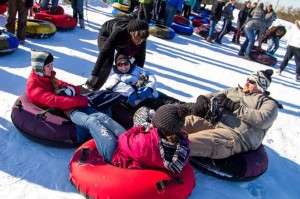 I’m frequently asked about how we put together retreats at SpringHill Camps to provide for maximum impact. And, like most things, it’s helpful to start with the end in mind. By focusing on what we want to accomplish, rather than what we want to do, we end up doing the things that accomplish the most.
I’m frequently asked about how we put together retreats at SpringHill Camps to provide for maximum impact. And, like most things, it’s helpful to start with the end in mind. By focusing on what we want to accomplish, rather than what we want to do, we end up doing the things that accomplish the most.
There are three things that guide my team as we put together retreats. They provide a framework for youth retreats, family camps, and the custom programs we put together for all kinds of organizations we partner with.
One thing to keep in mind is that these three things are scalable. So, whether you’re working on a single retreat for 30 or 40 students, or planning a retreat season for thousands, they work.
1. We want every participant to grow in their relationship with Jesus Christ.
This is not only core to our mission as an organization, it is my personal passion. I want every student, every leader, and even my staff members and volunteers to be challenged and encouraged in their walk with Christ during a retreat.
To do this effectively, programs have to be designed to meet participants where they are and move them further along towards where God wants them to be. For some, this means they may be less antagonistic to the message of the Gospel. Others may actually make a first time commitment to follow Christ. Many may also realize their need to get back on track. And we must not forget to consider how some may be moved along on their journey of discipleship.
Our approach centers around creating experiences where participants see, hear and experience the Gospel. For some, like our public school groups, we focus on experiencing the Good News in how they are related to by our staff and cared for. For most, it’s more explicit, and they are invited to make a new or renewed commitment to Christ.
As a result of our Winter Teen Retreats, 95% of students say they want to grow more in their relationship with God, and over 60% of them make some kind of significant spiritual commitment.
2. We want to strengthen relationships with trusted adults and peers.
A shared experience can be a powerful thing. When that experience centers around the small group, the local church, or some other engaged community, it’s even more powerful. The reality is, our staff and programs only reach kids for a few days at a time, but it is the privilege of their youth pastors, adult leaders and parents to minister to them the rest of the year.
During a weekend away at camp, those leaders may spend as much time with those students as they would during an entire year of ministry at home. (48 hours at a retreat is roughly equal to 48 Sundays of class time or a school years’ worth of youth group.)
Because of this reality, we provide opportunity and resources for our guests to meet and process in small groups. We design activities and experiences that they can do together—like our Broomball Tournament, Gameshow, and 3-on-3 Basketball games.
After one of our retreats, about 9 out of 10 students say they developed stronger relationships with their youth leaders. We see similar results from our Family Camps, where the primary relationships strengthened are between parents and children.
3. We want our guests to go home changed in some way.
The question that drives our thinking here is, “What are you going to do or do differently because of your experience?” We believe the Gospel and those key relationships provide a framework in which people can make significant changes in their lives, with a ripple effect that can transform homes and communities.
For the last three years, we have consistently received notes after our family camp programs that describe marriages that had been on the brink, where husbands and wives decided to give it another chance.
We recently heard from a group of High School guys who have confided in their dads about their own addictions, and committed to accountability with one-another to live lives of purity.
One mom posted on facebook just last week that her son was doing his homework without prompting… and cleaning up after himself! She shared the dialogue:
Mom: “Thanks for working on that. I’m really happy you’re doing it on time instead of late.”
Son: “Yeah, I’m pretty motivated.”
Mom: “What’s got you motivated?”
Son: “Just being at SpringHill last weekend. I want to be doing my best.”
In my next few posts, I’ll discuss how these three goals are specifically played out from stage in our main sessions, in creative programming, and around camp at activities and meals.
When you’re planning a retreat, what are the key things you want to accomplish?
